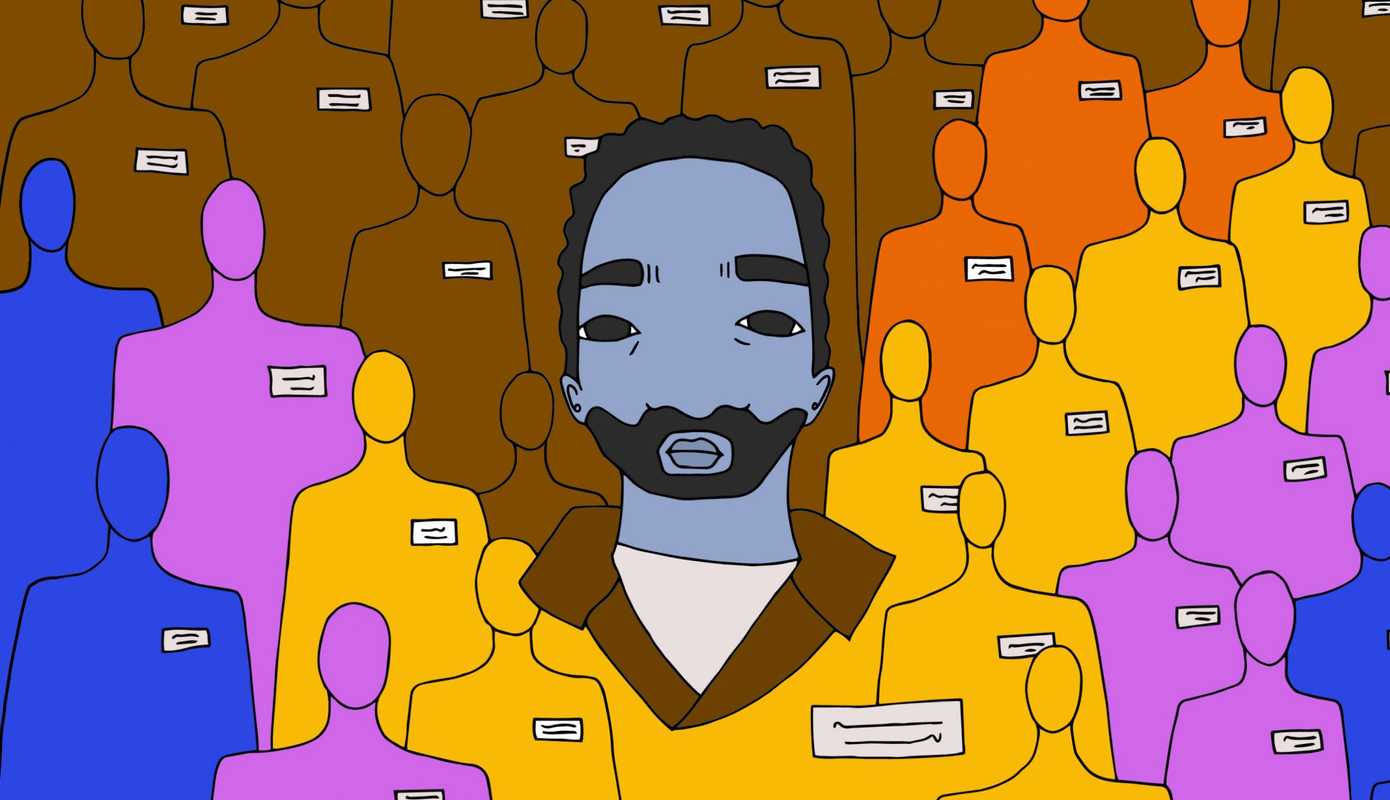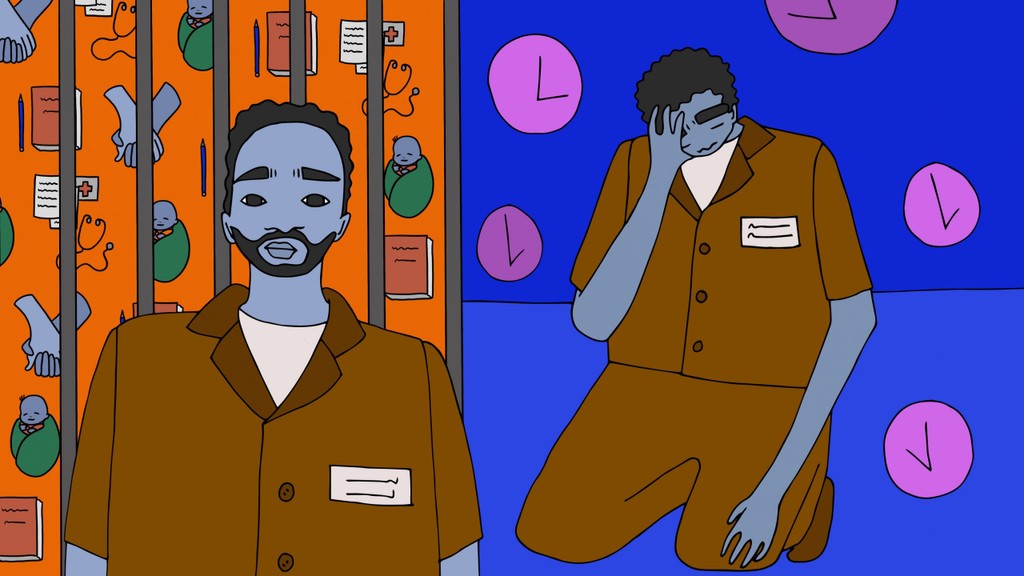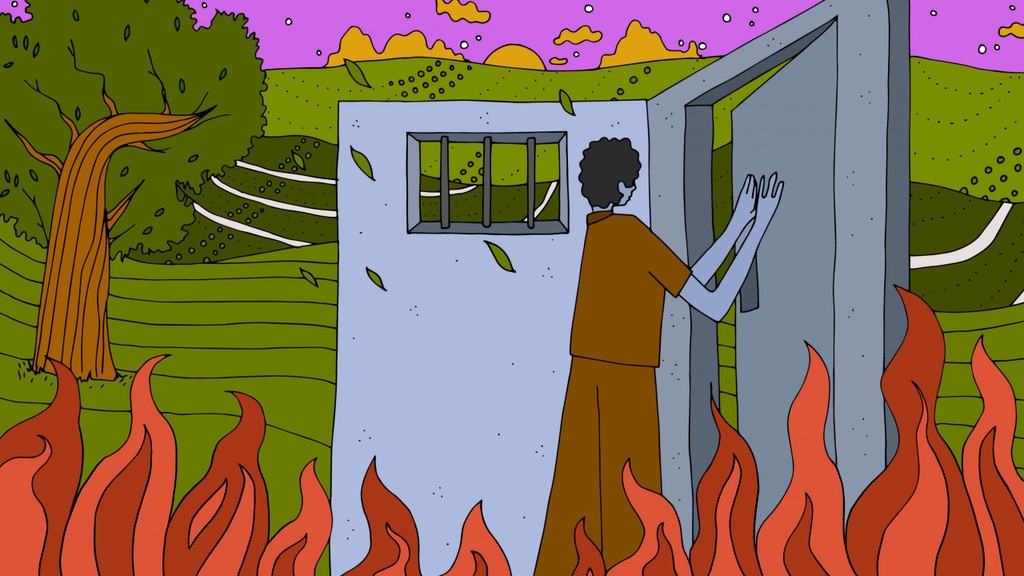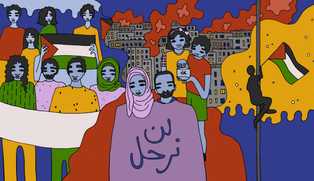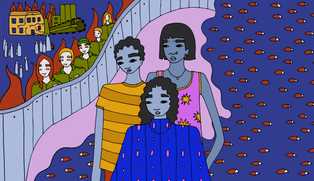This article is part of PALESTINE: WAYS OF BEING, a season centring under-explored areas of Palestinian life and liberation.
Introduction: Incarceration has always been a colonial endeavour in Palestine. Indeed, many of the prisons and police stations that were used to surveil and incarcerate Palestinians during British rule over Palestine are now used by the Israeli settler colonial regime for the very same purpose. Then and now, incarceration has been utilised as a mechanism to devastate Palestinian society. Since 1967 alone, approximately 800,000 Palestinians have been detained by the Israeli regime, and at the time of writing, 4,650 Palestinians – including 180 children – are behind bars in Israeli prisons. Many have served long sentences and others are stuck in cycles of repeat sentencing. Some are even held for months without charge under a procedure known as ‘administrative detention.’ This period can be indefinitely extended by the Israeli regime, and the charges – often fabricated – are always kept secret. It is a practice that Addameer, the Prisoner Support and Human Rights Association, has defined as a form of psychological torture. Palestinian prisoners are also subjected to physical forms of torture including beatings, being put in stress positions, and sleep deprivation.
Despite this unimaginably cruel reality, Palestinian prisoners have not given up their political agency, nor their will to live. From inside prison cells we have seen thousands of prisoners undertake hunger strikes over several weeks in collective action against the prison administration, and we have also seen them continue to communicate with allies around the world, garnering solidarity and love for the Palestinian struggle for liberation.
Palestinian prisoners are at the heart of the Palestinian struggle. It is through them that we continue to learn the true meaning of perseverance. The following words come from one such Palestinian prisoner, currently incarcerated by the Israeli state, who has chosen to remain anonymous.
*
When I was young, I dreamt of becoming a doctor. I was drawn to the profession because it gave hope and life to people in a world full of despair and death. I nurtured my dream for a decade, until life slapped me with bitter reality and told me that childhood dreams are not attainable. Indeed, the world we live in is harsh and difficult, a sharp contrast to a rose-tinted youth. It’s as if once we leave childhood, life tells us that there is no time in this place for dreams.
For me, growing up happened quickly; when I turned 16, I found myself behind bars. At first I thought I was living a nightmare, but it quickly became clear to me that this was my new reality. I remained in administrative detention for two and a half years without charge. Those years were not easy. But at the same time, my first experience in prison was a turning point that gave my life meaning.
As soon as I was released, I pursued a college education with a sense of urgency, not knowing what life had in store for me. I had already learned from my previous incarceration that there was no place for my dream to pursue medicine. I decided to change direction and study journalism, with the hope that I could share the cause of my people with the world. Not long after, however, I was re-arrested once more and charged with taking part in ‘student activities’.
My second arrest marked the beginning of my engagement with Karl Marx, Frantz Fanon and Paolo Friere, among many others. Through their writings, I came to the conclusion that the priority must be the liberation of the colonised mind. This inspired me to pursue the subjects of psychology and sociology. It was in these subjects that I finally found my place.
My academic pursuits were consistently disrupted by a series of detentions. After my second release, I was arrested again and held for two months at an interrogation centre. Here, I was subjected to torture before being released due to the lack of sufficient evidence against me. But the relief of my release was, again, short-lived. I was continually summoned by Israeli intelligence. I felt like a fugitive on the run; my time was always limited. It was as if prison was always chasing after me with handcuffs.
“Prison seizes you from time, and time away from you”
I was determined to finish my schooling quickly. I completed my Bachelor’s degree in Psychology at Birzeit University. I was then denied the right to study abroad for my Masters by the Israeli regime. I had no choice but to pursue my postgraduate education in Palestine at the same university. After my Masters, I was once again arrested and held in administrative detention for a year and a half. When I was released, I decided to pursue a PhD and was granted a spot to study abroad at a Swiss university. Alas, it was not to be. Just a few weeks before the start of my programme, I was arrested again. This time, I was sentenced to four years in prison, and as I write this piece, I have completed nearly three years of that sentence – a time in which I could have completed my PhD, if I was free.
In this life of mine, prison has become a constant feature. In occupied Palestine, the prison system is a subtle and systemic form of torture that focuses more on destroying the soul than the body. It was not only my physical freedom that was deprived, but also my cognitive freedoms. Imprisonment takes away your ability to dream, your memories, your relationships. Most of all, prison takes away your sense of self and your humanity. Both escape from you in front of your eyes, from your hands, totally against your will.
Prison seizes you from time, and time away from you, so you sit in a cyclical loop. It eliminates any notion of development, movement or transformation. You are enslaved to a circular time continuum that oscillates between present and past, blacking out the future entirely. Palestinian prisoner Walid Dakka, who has been imprisoned for 37 years, described it as living in a time that is not yours.
It makes me wonder if prisons are designed as an experiment in suffering an extreme form of existential pain: the separation of yourself from the world. It is a separation that makes you rethink everything, even your existence as a human being.
But my experience in prison has also taught me valuable lessons. It has reminded me that freedom cannot be achieved through words but rather actions that will always have a cost. It has shown me the cruelty of human kind. The emotional intensity of the experience is so overwhelming that it turns you into a highly sensitive being, one that is overwhelmed with happiness by simply passing by a tree, or seeing the sun set. In some ways, it takes you back to the simple joys of one’s childhood.
Captivity has also taught me to give myself to my people without limits. Their aspirations for freedom and justice are my own and so my dreams are the dreams of the many. Even though we suffer in prison, our secret weapon is that we do not know despair and we believe in the future. As Turkish-Polish poet Nazim Hikmet wrote, “The most beautiful days we haven’t seen yet.”
In Palestine, thousands of Palestinians are held as political prisoners in Israeli jails. Yet there are also six million Palestinians who have been living in the largest prison in history for over seven decades. This is a prison where the people suffer from ethnic cleansing, dispossession and apartheid. Six million more are displaced and exiled beyond the prison walls, waiting and dreaming of return. Whilst colonialism may have snatched away the childhoods of millions of Palestinians – including mine – it has not destroyed the hope that lives within us, nor our desire and deep yearning for freedom and justice. The liberation of Palestine may seem like an unimaginable task at times, but I am certain that my people will not tire until their freedom is achieved.
Many thanks to the anonymous facilitator for enabling contact with the author of this piece, and for writing the introduction.
*
At Skin Deep, we make space for Black creatives and creatives of colour to tell radical stories that help usher just new worlds into being. We are a non-profit community interest company and funding is a constant struggle, particularly for some of the issues we believe are the most urgently deserving of our care and attention – like Palestinian liberation. If you believe in the importance of stories like the ones in this season, please support our organisation: become a member, or make a one-off donation.
*
A note on language: Throughout this season we use the terms ‘settler colonialism’ and ‘apartheid’ in reference to Israel. These terms are not employed solely for creative or descriptive purposes, but have a clear basis in international law and are supported by academic publications and leading human rights organisations. These frameworks encourage us to move away from the defunct ‘two state’ model which is predicated on partition and ethno-religious separation of people. Justice and freedom lie at the heart of our work and we have been listening to Palestinian thinkers and scholars who imagine their future as a decolonial one, where decolonisation means the repatriation of indigenous land and life. In order to further this vision, it is important to use accurate and detailed language which reflects the reality on the ground.
Further reading on these terms and ideas:
Abdo, Nahla and Yuval-Davis, Nira (1995), ‘Palestine, Israel and the Zionist Settler Project’, in D. Stasiulis, and N. Yuval-Davis (eds), Unsettling Settler Societies: Articulations of Gender, Race, Ethnicity and Class, SAGE.
Jabary Salamanca, Omar, Mezna Qato, Kareem Rabie & Sobhi Samour (2012) Past is Present: Settler Colonialism in Palestine, Settler Colonial Studies, 2 (1): 1-8.
Said, Edward (1979). Zionism from the Standpoint of Its Victims. Social Text, (1), 7-58.
Veracini, Lorenzo (2006) Israel and Settler Society, Pluto Press.
Ilan Pappe, “Zionism as Colonialism: A comparative view of Diluted Colonialism in Asia and Africa” South Atlantic Quarterly (2008) 107 (4): 611–633.
Jong, Anne de. “Zionist Hegemony, the Settler Colonial Conquest of Palestine and the Problem with Conflict: A Critical Genealogy of the Notion of Binary Conflict.” Settler Colonial Studies 8, no. 3 (2018/07/03 2018): 364-83. https://doi.org/10.1080/2201473X.2017.1321171.
Kauanui, J Kēhaulani. “‘A Structure, Not an Event’: Settler Colonialism and Enduring Indigeneity.” Lateral 5, no. 1 (2016): 5-1.
Tuck, Eve, and K Wayne Yang. “Decolonization Is Not a Metaphor.” Decolonization: Indigeneity, education & society 1, no. 1 (2012).
Patrick Wolfe. “Settler Colonialism and the Elimination of the Native.” Journal of Genocide Research 8, no. 4 (2006/12/01 2006): 387-409. https://doi.org/10.1080/14623520601056240.

